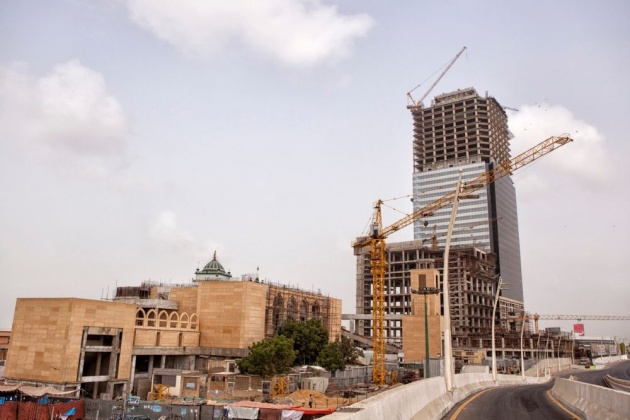 The Sufi shrine that dates to the 8th century in Karachi’s posh Clifton neighborhood has served as the area’s defining landmark for decades. Not anymore.
The Sufi shrine that dates to the 8th century in Karachi’s posh Clifton neighborhood has served as the area’s defining landmark for decades. Not anymore.
Dwarfing the monument today is a gleaming 62-story highrise, coming up right next door. The building is one of at least half a dozen projects springing up in the locality as developers from Dubai’s Emaar Properties PJSC to local tycoons change the face of Pakistan’s financial hub and the skylines of many smaller towns.
The construction boom also marks the nation’s emergence as a frontier market after Prime Minister Nawaz Sharif averted a balance-of-payments crisis with help from the International Monetary Fund and resumed selling stakes in state companies. He is boosting infrastructure spending as the $232 billion economy expands at the fastest pace since 2008 amid the cheapest borrowing costs in 42 years.
“It is the best, undiscovered investment opportunity in emerging or frontier markets,” said Charlie Robertson, London-based chief economist at Renaissance Capital Ltd. “What’s changed is the delivery of reforms -- privatization, an improved fiscal picture and good relations with the IMF.”
Shrugging off sectarian violence, bombings, killings and kidnappings, the benchmark KSE100 stock index has advanced about 16 percent in the past 12 months, featuring among the world’s top 10 performers.
D.G. Khan Cement Co., controlled by billionaire Mian Muhammad Mansha, and Cherat Cement Co. have announced expansion plans, while steelmakers are selling shares.
Steel IPOs
Amreli Steels Ltd., the nation’s biggest maker of steel bars used in construction, is planning a share sale to help double capacity. Mughal Iron & Steel Industries Ltd. completed an initial public offering in April.
Pakistan’s cement industry has rallied 57 percent in the past year, more than triple the gains by the benchmark, according to data compiled by Bloomberg. D.G. Khan Cement, the third-largest maker of the construction material, has jumped 62 percent and Maple Leaf Cement Factory Ltd. has surged 161 percent and Fauji Cement Co. Ltd. has gained 81 percent.
“The construction industry is seeing a boom, and there is still juice left in the cement rally,” said Mir Muhammad Ali, chief executive officer of UBL Fund Managers Ltd. that handles about 56 billion rupees ($550 million) in stocks and bonds in Karachi. “Overall economic improvement has also helped.”
Sharif, who took power in May 2013, boosted infrastructure spending by 27 percent to 1.5 trillion rupees for the year starting Wednesday, July 1.



